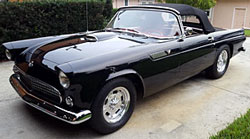|
Author
|
Message
|
|
Tim Quinn
|
|
|
Group: Forum Members
Last Active: 5 Years Ago
Posts: 266,
Visits: 3.5K
|
Thanks for your info
Tim
Saturday AM
Florida
|
|
|
|
|
62bigwindow
|
|
|
Group: Forum Members
Last Active: 2 Years Ago
Posts: 884,
Visits: 14.3K
|
Put in the jets you want to run then drive it. If you get a surge while at cruising speed then the jets are too small. A wideband is a nice diagnostic tool but not necessary. There is alot of info online on carb tuning. A vacuum gauge is a must in my opinion.
Durham Missouri
|
|
|
|
|
Tedster
|
|
|
Group: Forum Members
Last Active: 4 Years Ago
Posts: 513,
Visits: 153.3K
|
With the right gearing, a lighter car can do better. Maybe 20 to 24 mpg highway. Though not with corn gas.
|
|
|
|
|
FORD DEARBORN
|
|
|
Group: Forum Members
Last Active: 9 days ago
Posts: 798,
Visits: 113.5K
|
18 mpg is going to be tough to beat, IMO. At least that's the most I can get after careful tuning and as mentioned above, too lean and your going to burn parts. If I can remember right, 16 to18 mpg were figures offered on this forum and those numbers are pretty much what a modern full size vehicle with a V8 will achieve at best also. Unless there are performance issues, your probably in good tune as is. Hope this helps, JEFF..............
64F100 57FAIRLANE500
|
|
|
|
|
Tedster
|
|
|
Group: Forum Members
Last Active: 4 Years Ago
Posts: 513,
Visits: 153.3K
|
Wideband O2 sensors don't cost that much, the fuel savings alone on a Florida to Michigan trip and back would probably pay for itself, assuming there's anything left on the potential fuel economy table.
You can jet down a fair bit to improve cruise fuel economy, but keep in mind jet size also changes the air fuel ratio when under load, under power acceleration. Getting both of these right is critical if you're going to dig in to carb tuning. Typically involves enlarging power circuit fixed orifices with a pin vise. If too lean under acceleration it will probably burn a valve. As Charlie said a wideband O2 sensor is the best way for most people to tune a carburetor. Make sure the distributor ignition curve is optomized to include vacuum advance before getting too deep into the carb adjustments. If the ignition system is weak, leaner fuel mixtures will expose it. A cooler heat range plug may help too, especially on a long highway run.
|
|
|
|
|
Florida_Phil
|
|
|
Group: Forum Members
Last Active: 3 Years Ago
Posts: 1.2K,
Visits: 285.6K
|
My 292 is running a Holley 1848 465 on an iron 1957 intake manifold. I have a 4.11 gear and a three speed with O/D. I like the throttle response of the 465. I've thought about upgrading to a 600. From what I have read, I wouldn't be gaining that much. Like others have said, a vacuum secondary carb is only going to use what it can. I wouldn't change carbs myself.

|
|
|
|
|
Tim Quinn
|
|
|
Group: Forum Members
Last Active: 5 Years Ago
Posts: 266,
Visits: 3.5K
|
Thanks for your time and input.
Tim
Florida
|
|
|
|
|
charliemccraney
|
|
|
Group: Moderators
Last Active: Last Year
Posts: 6.1K,
Visits: 443.0K
|
Impossible to answer on a forum. Bare minimum, look at the plugs and make a judgment call based on how it currently looks. I'm not good at reading plugs so I use an O2 sensor. No uncertainty with that and you can gather more info in a shorter time, speeding up tuning and also no handling hot plugs on a hot engine on a hot day at the side of the highway for an accurate read..
Lawrenceville, GA
|
|
|
|
|
Tim Quinn
|
|
|
Group: Forum Members
Last Active: 5 Years Ago
Posts: 266,
Visits: 3.5K
|
Right now the primary jets are .67, I'm thinking of replacing them with .64 for the trip to Detroit and put the .67 jets in the secondary position.
Would those jets be too lean ?
Whatda ya think ?
Tim
90 degree Florida
|
|
|
|
|
charliemccraney
|
|
|
Group: Moderators
Last Active: Last Year
Posts: 6.1K,
Visits: 443.0K
|
Smaller jets will lean it out, which may provide better economy as long as it is not too lean but also possibly at the expense of power. 600cfm is probably more than the engine needs but it is vacuum secondary so it should be fine. I don't think it is too big. It's best to do this type of stuff with the help of an O2 sensor so you can see what is going on in real time. Not something that is good to guess about during a 1000+ mile trip.
Lawrenceville, GA
|
|
|
|